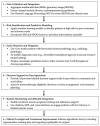Transforming Cancer Care: A Narrative Review on Leveraging Artificial Intelligence to Advance Immunotherapy in Underserved Communities
- PMID: 40806968
- PMCID: PMC12347673
- DOI: 10.3390/jcm14155346
Transforming Cancer Care: A Narrative Review on Leveraging Artificial Intelligence to Advance Immunotherapy in Underserved Communities
Abstract
Purpose: Cancer immunotherapy has transformed oncology, but underserved populations face persistent disparities in access and outcomes. This review explores how artificial intelligence (AI) can help mitigate these barriers. Methods: We conducted a narrative review based on peer-reviewed literature selected for relevance to artificial intelligence, cancer immunotherapy, and healthcare challenges, without restrictions on publication date. We searched three major electronic databases: PubMed, IEEE Xplore, and arXiv, covering both biomedical and computational literature. The search included publications from January 2015 through April 2024 to capture contemporary developments in AI and cancer immunotherapy. Results: AI tools such as machine learning, natural language processing, and predictive analytics can enhance early detection, personalize treatment, and improve clinical trial representation for historically underrepresented populations. Additionally, AI-driven solutions can aid in managing side effects, expanding telehealth, and addressing social determinants of health (SDOH). However, algorithmic bias, privacy concerns, and data diversity remain major challenges. Conclusions: With intentional design and implementation, AI holds the potential to reduce disparities in cancer immunotherapy and promote more inclusive oncology care. Future efforts must focus on ethical deployment, inclusive data collection, and interdisciplinary collaboration.
Keywords: Predictive Modeling; artificial intelligence; cancer immunotherapy; health disparities; social determinants of health (SDOH).
Conflict of interest statement
J.C. serves as a consultant and Immunotherapy Subject Matter Expert for Guidepoint Consulting (New York, NY, USA) and is an inventor on Patent Number(s): US20170044496A1 and received royalties for this technology license.
Figures


Similar articles
-
The Role of AI in Nursing Education and Practice: Umbrella Review.J Med Internet Res. 2025 Apr 4;27:e69881. doi: 10.2196/69881. J Med Internet Res. 2025. PMID: 40072926 Free PMC article.
-
Prescription of Controlled Substances: Benefits and Risks.2025 Jul 6. In: StatPearls [Internet]. Treasure Island (FL): StatPearls Publishing; 2025 Jan–. 2025 Jul 6. In: StatPearls [Internet]. Treasure Island (FL): StatPearls Publishing; 2025 Jan–. PMID: 30726003 Free Books & Documents.
-
AI in Medical Questionnaires: Scoping Review.J Med Internet Res. 2025 Jun 23;27:e72398. doi: 10.2196/72398. J Med Internet Res. 2025. PMID: 40549427 Free PMC article.
-
Bridging the digital divide: artificial intelligence as a catalyst for health equity in primary care settings.Int J Med Inform. 2025 Jul 18;204:106051. doi: 10.1016/j.ijmedinf.2025.106051. Online ahead of print. Int J Med Inform. 2025. PMID: 40706198 Review.
-
Artificial Intelligence in Hypertrophic Cardiomyopathy: Advances, Challenges, and Future Directions for Personalized Risk Prediction and Management.Cureus. 2025 Jul 14;17(7):e87907. doi: 10.7759/cureus.87907. eCollection 2025 Jul. Cureus. 2025. PMID: 40809637 Free PMC article. Review.
References
-
- Hosseinkhani N., Derakhshani A., Kooshkaki O., Abdoli Shadbad M., Hajiasgharzadeh K., Baghbanzadeh A., Safarpour H., Mokhtarzadeh A., Brunetti O., Yue S.C., et al. Immune Checkpoints and CAR-T Cells: The Pioneers in Future Cancer Therapies? Int. J. Mol. Sci. 2020;21:8305. doi: 10.3390/ijms21218305. - DOI - PMC - PubMed
-
- Yarchoan M., Gane E.J., Marron T.U., Perales-Linares R., Yan J., Cooch N., Shu D.H., Fertig E.J., Kagohara L.T., Bartha G., et al. Personalized Neoantigen Vaccine and Pembrolizumab in Advanced Hepatocellular Carcinoma: A Phase 1/2 Trial. Nat. Med. 2024;30:1044–1053. doi: 10.1038/s41591-024-02894-y. - DOI - PMC - PubMed
-
- Gargett T., Truong N.T.H., Gardam B., Yu W., Ebert L.M., Johnson A., Yeo E.C.F., Wittwer N.L., Tapia Rico G., Logan J., et al. Safety and Biological Outcomes Following a Phase 1 Trial of GD2-Specific CAR-T Cells in Patients with GD2-Positive Metastatic Melanoma and Other Solid Cancers. J. Immunother. Cancer. 2024;12:e008659. doi: 10.1136/jitc-2023-008659. - DOI - PMC - PubMed
Publication types
LinkOut - more resources
Full Text Sources
Miscellaneous

